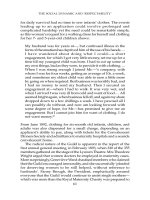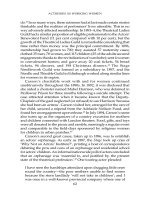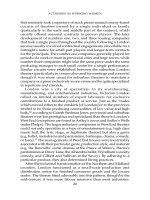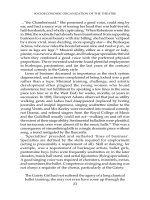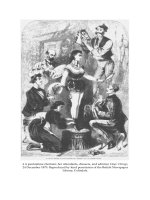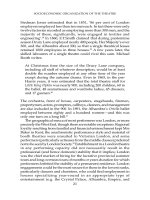ACTRESSES AS WORKING WOMEN 35
Bạn đang xem bản rút gọn của tài liệu. Xem và tải ngay bản đầy đủ của tài liệu tại đây (25.16 KB, 1 trang )
ACTRESSES AS WORKING WOMEN
women in the nineteenth century. The following conditions were
unique to women’s employment in the theatre:
1 In the context of career opportunities, female performers were
not pioneers: the first professional English actresses emerged in
1660.
2 These professionals and their successors held exclusive rights to
their occupations—men could not be actresses, ballet girls,
chantresses, etc.—and competed only against other women.
3 These women neither encroached on a male labour market nor
did they affect the scale of wages for men in the same trade, and
so they were immune from pressures to give over their jobs to
principal (male) breadwinners.
4 Public demonstration of education in the liberal arts was sanctioned and applauded in many branches of theatrical performing, and enhanced women’s social and professional credibility.
5 Women and men in the theatre generally received equal pay for
work of equal value (as assessed by box office appeal) and both
had ingress to the highest ranks of management.
6 In the co-sexual work place, female performers enjoyed freedoms
unknown to women in other socially sanctioned occupations.
7 The stage could be used as a springboard into marriage; this could
either serve to eclipse women’s original class and provide an exit
to the leisured classes, or it could enhance women’s stability
within the trade.
8 The theatre’s reputation for immorality reduced the necessity for
social hypocrisy; female performers had to be worldly-wise, selfsufficient, self-determining, and hard-working and it was useless to pretend otherwise.
Rosy-eyed recruits from every class also realized that though an
actress could experience as much drudgery as any domestic servant,
as much insecurity and abuse as any teacher or governess, as much
menial labour as any agricultural worker, the same sorts of sexual
and age discrimination as women in retail trades, as much exposure
to disease and depravity as nurses, and although she could know
the exploitation, tedium, and physical strain of women in
manufacturing and mining, the actress alone enjoyed an element of
excitement and an unequalled degree of personal and sexual freedom
in the practice of her trade. As Simone De Beauvoir observed:
actresses might be independent and spend a lot of time with men,
18
